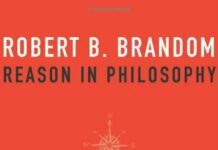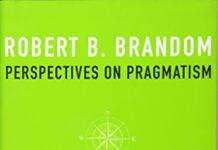
Ebook Info
- Published: 2019
- Number of pages: 839 pages
- Format: PDF
- File Size: 6.81 MB
- Authors: Robert B. Brandom
Description
Forty years in the making, this long-awaited reinterpretation of Hegel’s The Phenomenology of Spirit is a landmark contribution to philosophy by one of the world’s best-known and most influential philosophers.In this much-anticipated work, Robert Brandom presents a completely new retelling of the romantic rationalist adventure of ideas that is Hegel’s classic The Phenomenology of Spirit. Connecting analytic, continental, and historical traditions, Brandom shows how dominant modes of thought in contemporary philosophy are challenged by Hegel.A Spirit of Trust is about the massive historical shift in the life of humankind that constitutes the advent of modernity. In his Critiques, Kant talks about the distinction between what things are in themselves and how they appear to us; Hegel sees Kant’s distinction as making explicit what separates the ancient and modern worlds. In the ancient world, normative statuses—judgments of what ought to be—were taken to state objective facts. In the modern world, these judgments are taken to be determined by attitudes—subjective stances. Hegel supports a view combining both of those approaches, which Brandom calls “objective idealism”: there is an objective reality, but we cannot make sense of it without first making sense of how we think about it.According to Hegel’s approach, we become agents only when taken as such by other agents. This means that normative statuses such as commitment, responsibility, and authority are instituted by social practices of reciprocal recognition. Brandom argues that when our self-conscious recognitive attitudes take the radical form of magnanimity and trust that Hegel describes, we can overcome a troubled modernity and enter a new age of spirit.
User’s Reviews
Reviews from Amazon users which were colected at the time this book was published on the website:
⭐Reading Hegel’s Phenomenology of Spirit can be a challenging task, not only because of the originality of thought contained in the work, but also because it is so dependent on what came prior (Immanuel Kant) in German idealist thought. In addition, contemporaries of Hegel, like the philosopher Arthur Schopenhauer, have not been kind to him, while others, e.g., the Young Hegelians (such as Karl Marx) have either engaged in uncritical adulation of Hegel’s writings or gave an interpretation that some argue is not justified from a study of them.Early on in this work, the author makes it crystal clear that he is giving the reader a pragmatic, hermeneutic reading of the Phenomenology. Hence readers will encounter The Phenomenology of Spirit as the author has understood it, not perhaps as Hegel intended it. But whether Hegel intended to convey the information in a manner that is done in this book is perhaps irrelevant. It does not matter if the book’s content is an accurate representation of Hegel. All that matters is whether it contains ideas that are both interesting and relevant to modern philosophical thought. It certainly does, even though finding this out will demand some time reserves that may be prohibitive for some who want to study the book.For this work must be studied, and not just read, because there are some subtleties in the conceptual constructions that require concentrated effort from the reader. The author though does not hesitate to use diagrams as a didactic tool (and interestingly feels the need to give a semi-apology for their use), and he deploys repetition to make sure there is sufficient recollection from the reader to assist in appreciating the flow of the presentation in this sizeable book.There is a lot in this book that can be appreciated by those readers, such as the reviewer, who are not specialists in philosophy or students interested in Hegelian thought or German idealism in general. These readers involved in areas such as artificial intelligence, machine learning, agent theory, or cognitive grammar will find some fascinating ideas and discussions in the book. Sometimes the author is aware of the connection or applicability to these fields, referring at one point in the book to ‘action-theory’ and how its emphasis on punctiform events is to be distinguished from Hegel’s emphasis on processes. But shortly thereafter, the author, perhaps without being explicitly aware of it, engages in a discussion that reads like it came right out of a text on planning theory in artificial intelligence or a text on the Pi-calculus theory of mobile processes in computer science.There are several other instances where the author’s discussions taken on a multi-faceted quality and parallel some that occur outside the purview or awareness of contemporary philosophy. For example, the discussion on recollection and how the process of experience determines conceptual contents and semantic relations can find expression as a topos of experience using a certain area of mathematics called topos theory. Another example is where the author is discussing the notion of ‘exclusive difference’ and how objects are to be identified and individuated by their properties is remarkably similar to the kinds of considerations that occur in the area called ontological engineering.Because of these examples and many others in the book, some readers may be tempted to think that the entire structure of the Phenomenology could be given a formal mathematical formulation, which may find application in conceptual blending and other areas of artificial intelligence. This would be an interesting development, since Hegel, as this book indicates from time to time, was sometimes skeptical of the claims of science, and was clearly annoyed (again brought out in the book) by Enlightenment reactions to religious thought.The author’s contention that Hegel’s thought may be categorized as a pragmatist idealism may raise the eyebrows of some contemporary philosophers, who believe that any designation of a system of thought as pragmatist is vulgar and compromising. But regardless of one’s attitude about Hegel before the study of this book or whether one believes that it represents Hegel’s intent in the Phenomenology, the study of the book is well worth the time and effort. Indeed, if the book was available to Arthur Schopenhauer perhaps his attitude about Hegel would have been different…..
⭐Robert Brandom is easily the most important thinker alive today. He requires the kind of assiduous attention that monks once gave to Duns Scotus or Thomas; it is not for the merely curious, or someone looking for something that is interesting. The important piece of it for me is the way he uses Hegel, long thought by analytic philosophers since Russell and Moore as the master of obscurantism and the precursor to some of the evil that plunged the last century in blood. Brandom uses Hegel in ways that opens him up for contemporary thought in ways I had known possible. He’s also dealt with Heidegger in an equally important and consequential way. If you have a strong background in philosophy; you’ve read deeply in pragmatics and semantics, you are familiar with Hegel’s “Science of Logic” and “The Phenomenology of Spirit,” you will be amazed. For the undergraduate philosophy major, this is why you are studying philosophy. If you are new to philosophical reasoning and want to see a paradigm example this is your book. Even for someone like me, who has been teaching philosophy to graduates and undergraduates for thirty years (more, actually), this book (and others by Brandom) made me come alive. This is living thought whether you are persuaded or not.
⭐An astoundingly brilliant bridging of the continental-analytic divide that will only be comprehensible to advanced students, teachers of philosophy, and philosophically sophisticated nonphilosophers. The writing is clear and easy to follow but is heavily laden with field-specific jargon requiring extensive previous familiarity with both Anglo-American and post-Kantian terminology. Do not purchase this without a strong philosophy background – familiarize yourself with foundational texts instead. For anyone sufficiently equipped, this is a must read. Certainly the most impressive philosophical work of recent memory.
⭐Brandom spent decades working his way up to the publication of this book, and let me just say, it does not disappoint. Latent ideas in Hegel are carefully drawn out and fully explored, thorny exegetical issues are handled gracefully, and previously inscrutable passages are illuminated in novel and exciting ways. The book is stunningly clear and painstakingly written, and I’ve come away from it with a considerably greater appreciation for The Phenomenology of Spirit. This is an absolute triumph, and will undoubtedly shape philosophy for decades to come.
⭐A characteristic specimen of analytic philosophy. The author tries to comment on a text by itself very difficult to comprehend by more perplexing trains of thought. Completely incomprehensible violating the principle that a philosophical treatise is worthwile if it can help the human beings to overcome their passions. Perhaps is good for the specialized academic cyrcles but not for the educated reader.
⭐One of the better books that Brandom has written. Yes, it took forever but it was worth it. His unique arguments add more interpretations to the scholarship. I would recommend this one for anyone trying to get into Hegel.
⭐Brandom may just turn out to be the most important philosopher ever to write originally in English. This is his magnum opus, showing the Hegelian roots of his previous big book Making It Explicit. Aside from being a landmark in Hegel scholarship, this book carries a profound ethical message. Priceless.
⭐Brandom provides clear, powerful argumentation for an intelligent position that might be correct. This is a masterwork.
⭐Robert Brandon finally publishes his long-awaited commentaries on Hegel’s Phenomenology. These pages explain in the most transparent way the meaning of the re-appropriation of Hegel’s Legacy for analytic philosophy
⭐Essa leitura da Fenomenologia do Hegel coloca o autor alemão em diálogo com o que o último século viu de produções na filosofia analítica (com Frege e Lewis, por exemplo). Brandom escreve em uma linguagem clara e lógica, ainda que altamente abstrata. Essa obra certamente alimentará diversos debates contemporâneos, e é imprescindível pra quem gosta de circular na intersecção entre as filosofias “analítica” e “continental”.Fresh and helpful analytic interpretation of Hegel’s peculiar early work.
⭐I’m sure the book is great, but it arrived damaged and covered in a brown sticky goo. The jacket cover is stained and marked up as if someone had kicked it around for a while and then dropped it in a puddle of grease.
⭐Uma espetacular interpretação da Filosofia, em geral, e da de Hegel, em especial da Fenomenologia do Espírito.
⭐
Keywords
Free Download A Spirit of Trust: A Reading of Hegel’s Phenomenology in PDF format
A Spirit of Trust: A Reading of Hegel’s Phenomenology PDF Free Download
Download A Spirit of Trust: A Reading of Hegel’s Phenomenology 2019 PDF Free
A Spirit of Trust: A Reading of Hegel’s Phenomenology 2019 PDF Free Download
Download A Spirit of Trust: A Reading of Hegel’s Phenomenology PDF
Free Download Ebook A Spirit of Trust: A Reading of Hegel’s Phenomenology



